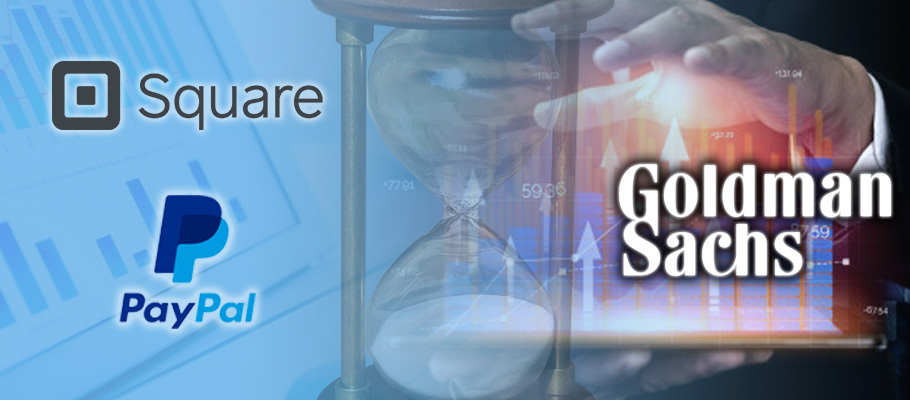
Published: September 9th, 2020
For only the second time in the history of the financial markets, the relatively new company’s market capitalization has surpassed that of an established investment bank. In the week ending Saturday, September 5, the market capitalization of Square, a FinTech payments platform, dashed past that of Goldman Sachs, an investment bank that is more than 151 years old.
The market capitalization of Square, a FinTech payments company, has surpassed Goldman Sachs, a Wall Street old-timer that is more than 150 years old. This news comes nearly precisely two months after another FinTech industry luminary, PayPal, swelled past the Bank of America in market cap. Bank of America is the second-biggest bank in the U.S. market.
The PayPal milestone made it worth more than all American banks aside from JPMorgan Chase & Co. While the coronavirus pandemic has been tough on most industries, the e-commerce space has managed immense growth, especially the digital payments sphere.
PayPal and Square managed double-digit revenue growth in Q2 of 2020. The expansion comes at a time when traditional payment and financial services providers are bleeding. Bank of America and JPMorgan set aside tens of billions of dollars to offset the expected defaults.
Devin Ryan, an analyst at JMP Securities, said that while Square’s performance was anticipated, it is also stunning to watch the kind of credit that FinTech companies are getting today. He noted that the companies’ favorable reception indicates a remarkable change of the guard in the finance world.
The overnight rise of PayPal and Square signifies the coming of age of the new guard. These companies started as niche players in some of the most overlooked finance segments and have been propelled by the prominence of digital payments and e-commerce.
Square’s shares have increased in value by more than 140% year on year, while PayPal’s shares are up 90%. Meanwhile, the KBW Bank Index, the benchmark stock index representing the banking sector, is down 32% for 2020.
Devin said that the market is differentiating between the firms’ future growth and what the consumers are willing to pay for such firms’ provisions now. The market views such companies’ financials from a mature, highly-regulated environment’s point of view, the analyst added.
The two companies are direct beneficiaries of the coronavirus pandemic because the health crisis has hastened digital payments’ penetration across every industry. The shift led to double-digit revenue growth in the second quarter.
The Federal Reserve’s emergency actions and the government’s stimulus payments to households brought more dollars to revive growth. The combination of all these factors benefitted FinTech and sent the tech companies’ shares soaring.
On the other side of the divide, the pandemic has had far-reaching adverse effects. Banks such as JPMorgan Chase and Bank of America have put aside a war chest worth tens of billions of dollars to address expected defaults of products and services like mortgages, credit cards, and commercial loans defaults.
The conventional banking industry’s profitability will be in the red for years as the country’s central bank maintains the benchmark interest rate at 0%.
Conor Witt, a research analyst for FinTech at CB Insights, said there are many ways of looking at the current situation. The divergence in performance may be a case of the new versus old or technology versus finance. He said that the two are just a few of the available viewpoints. It still can be a case of value versus growth, or it could even be a situation of the East Coast battling the West Coast, Conor added.
He thinks that the critical distinction is that Square and PayPal, which represent the new guard, rely on digital platforms that access more scale than banks. Banks, he said, are stuck with the traditional mode of operating physical storefronts. Besides, these businesses still deploy massive balance sheets for making loans. Conor said that banks’ approaches are costly and eat into the bottom line.
PayPal mostly handles payments, and it benefits from operating leverage in ways that banks cannot. Still, some analysts argue that the markets are stretching the value of famous technology firms ahead of a sharp weekly pullback.
According to these analysts, banks may end up doing better than their tech counterparts. The analysts said that markets had demonstrated froth signs for months with shares of companies such as Apple and Tesla rising day after day only to decline during a pullback. For instance, last Thursday, September 3, the tech shares experienced the biggest slump since March.
On Monday, September 7, Square’s market capitalization was $70.7 billion, some $0.2 billion ahead of Goldman Sachs. However, if another pullback comes on Thursday, September 10, the old bank may edge out Square.
PayPal opened the week strong at $247.5 billion compared to Bank of America’s $225.4 billion. Ryan said that despite tech’s decent rally, most traditional banks do not get the deserved credit for some of the high-growth digital projects they have initiated.
Ryan said that on the flip side, legacy firms such as the traditional banks have legacy infrastructure that they might need to retrofit to compete in the digital finance race. Such firms also have legacy margins they target. These benefits notwithstanding, firms that enjoy a digital backbone do not have to worry about legacy. If anything, they join the race where they incur lower costs of delivering services.
Ryan concluded that this equation quickly tells why PayPal, Square, and their digital counterparts will continue edging out traditional banks in the coming days.
Square, a digital payments platform, has surpassed Goldman Sachs in market cap. The second time in the history of financial markets, a company from the digital payments segment has edged out the 150-year-old institution. The achievement comes about two months after its digital counterpart, PayPal, dashed past the Bank of America in market cap.